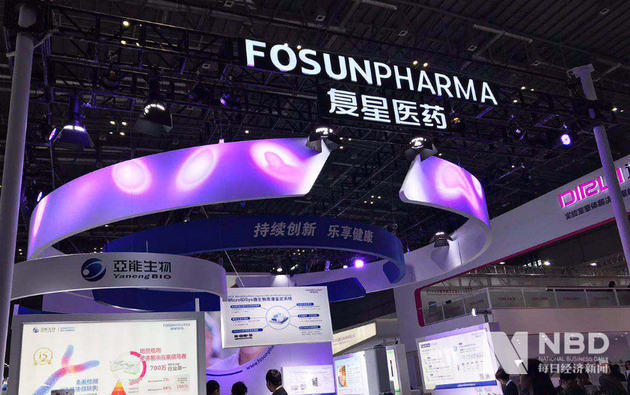Aug. 27 (NBD) -- Fosun Pharma (02196.HK) on Monday announced the latest progress towards spin-off and separate listing of Shanghai Henlius Biotech, Inc. (Henlius) on the Hong Kong stock exchange, saying that Henlius has submitted the Post Hearing Information Pack (the PHIP) to the bourse.
National Business Daily (NBD) noticed that it is the third time that the Fosun Pharma's biotech unit filed for initial public offering (IPO) and the second time for a Hong Kong listing.

File photo/Zhang Xiaoqing (NBD)
Three IPO attempts
Media reports said that the biotech firm aims to raise at least 600 million U.S. dollars through the float.
In the PHIP, NBD found that Henlius has completed three rounds of financing from pre-IPO investments. It's noted that Henlius boasts the first biosimilar in China which has obtained approval from the country's authorities.
As early as December 2016, the biotech company mulled an IPO on China's OTC market, "new third board", but there was no further news about the once planned listing.
Later, Hong Kong Exchanges and Clearing Market laid out new plans to broaden its listing regime. Taking effect on April 30, 2018, new rules allow the listing of biotech companies that do not meet any of the financial eligibility tests of the main board, thus paving the way for the listing of unprofitable biopharmaceutical firms like Henlius.
Eyeing the opportunity, in December 2018, Henlius pulled back from the OTC market and for the first time filed its application to list in Hong Kong, but the application expired six months later.
Highly susceptible to sole commercialized product
NBD noticed that since its inception in 2010, Henlius has brought only one product to the market, the biosimilar product HLX01 which came out this May. But the company revealed in the PHIP, it developed in-house over 20 biologic drug candidates and several immuno-oncology combination therapies in its pipeline, according to its PHIP.
Although HLX01 stepped into the commercial sales, there witnessed intense competition with brand-name drugs. As a result, Henlius recently cut the selling price by 14.8 percent.
"Henlius has advantages over HLX01's promotion but manufacturing may become the biggest barrier at early stage," noted industry insider Ye Cong to NBD, "In the mid and long term, it is of great importance that the company is capable of ensuring stable production, quality control and further cost reduction."
Henlius disclosed that it's very susceptible to the performance of HLX01 and other drug candidates to be commercialized, as it has a limited product portfolio with HLX01, the only commercialized drug product, and HLX02, HLX03, and HLX04 being its only product candidates having entered or completed Phase 3 clinical trials as at the Latest Practicable Date.
The biotech firm also warned in the PHIP, "If we are unable to achieve sufficient market acceptance or favorable pricing for such products, our path to profitability, in terms of both feasibility and timing, would be further harmed, as well as our prospects of generating sufficient cash to fund the development of our other pipeline projects."
According to the PHIP, Henlius posted revenues of 33.91 million yuan (4.73 million U.S. dollars) in 2017, 7.42 million yuan in 2018 and 924 thousand yuan for three months ended on 31 March, 2019.
However, the above metrics pale in comparison with its loss during the same period. The biotech firm reported an escalating loss, with the number reaching 384 million yuan in 2017, 505 million yuan in 2018 and hiking to 158 million yuan for the first three months of 2019.
Considerable loss is mainly a result of the sizeable investment in R&D for a biopharmaceutical company. "In 2017, 2018 and the three months ended 31 March 2019, Henlius had overall R&D expenditure (representing both capitalised and expensed R&D costs and expenses) of 637.1 million yuan, 972.5 million yuan and 225.4 million yuan, respectively," wrote the company in the PHIP.
Email: gaohan@nbd.com.cn


 川公网安备 51019002001991号
川公网安备 51019002001991号





